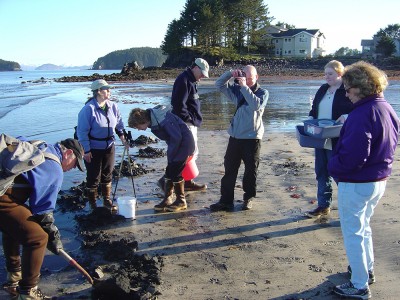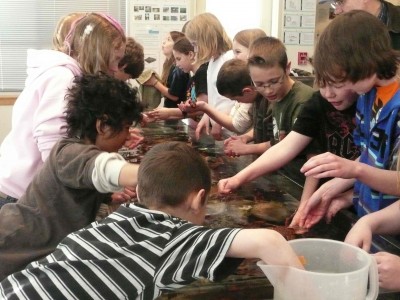Kodiak College becomes hub for community marine science education
by Jamie Gonzales |
Sometimes survival requires adaptation. And maybe a symbiotic partnership. Kodiak area teachers and kids of all ages are fortunate to have the chance to fall in love with science alongside Switgard Duesterloh, Ph.D., an assistant professor of marine biology with Kodiak College who runs the Kodiak Ocean Science Discovery Laboratory and Program.
When federal and district-wide budget troubles threatened to end a National Marine Fisheries Service and Kodiak Island Borough School District (KIBSD) community science education collaboration, the Kodiak Island Borough Assembly partnered with Kodiak College to fund Duesterloh's position. Together they're making sure Kodiak kids get the chance to roll up their sleeves for some hands-on marine science in their amazing ecosystems.Duesterloh, new to Kodiak College in 2012, has been sharing her knowledge of and passion for marine science in a bi-weekly column of the Kodiak Daily Mirror for several years writing about everything from sea stars to gray whales.
"I started the 'Amazing Nature' column as a way to educate the general public about the ocean and foster marine stewardship," says Duesterloh. "I believe that people only protect what they love and you can only love what you know."
Now imagine you're back in seventh grade. What do you remember most vividly, apart from the social dramas and traumas? For most of us it was one teacher who made lessons come alive. That's Duesterloh's job for both Kodiak College students and KIBSD kids.
Duesterloh introduces students and teachers to the Ocean Science Discovery Laboratory in the Kodiak Fisheries Research Center. Inside they quite literally roll up their sleeves to feel sea stars, seaweeds and other marine creatures. They meet area scientists and researchers and learn important age-appropriate lessons like the biological effects of ocean acidification.She also coaches the Kodiak High School Tsunami Bowl team. This year the team of five students researched and wrote a scientific paper about the Karluk estuary, including their proposed plan to improve salmon returns with plankton hatcheries. Tsunami Bowl students compete in a statewide marine science competition each year.
Given the opportunity, Duesterloh would make sure every student had the chance to spend a day or two aboard a boat learning about the marine world that figures so prominently into everyday life in Kodiak and much of Alaska.
"Despite all these amazing animals and habitats being so close, most of our students do not know about the biology of the larger animals," she says, "Or what role a kelp forest plays for the abundance of fish in the area, or why the whales come to Alaska in the summer."
The core science outreach program gives students the chance to learn an age-appropriate, hands-on lesson from Duesterloh once each year. In addition, open house and art workshop events are offered occasionally for the general public, and an after school Marine Stewardship Club has been offered for the past two years.
Duesterloh and Kodiak College have plans for older students, too, that bend traditional curriculum models. She says, "For next fall, I am planning a college course that combines an introduction to marine sciences and art, drawing inspiration from observing ocean creatures and their lifestyles."
And she's not giving up on her goal to get kids out on the water. "I would love to be able to take every student out on a boat at least once," she says. "In Kodiak, this is possible: if you decided to have a boat trip for one grade level and offered it once every year, we just have seven or eight classes per grade level!"
The day you wear rain gear and a life jacket for science class is the day you just might decide that this is what you want to wear to work every day. Kodiak College and UAA are glad to welcome Alaska's next generation of scientists into their indoor and outdoor classrooms.
 "Kodiak College becomes hub for community marine science education" is licensed under a Creative Commons Attribution-NonCommercial 4.0 International License.
"Kodiak College becomes hub for community marine science education" is licensed under a Creative Commons Attribution-NonCommercial 4.0 International License.
















